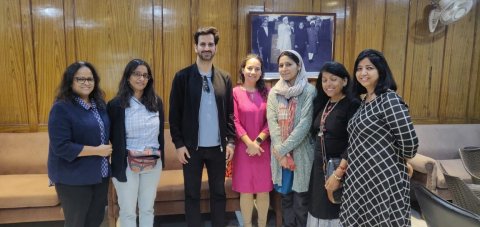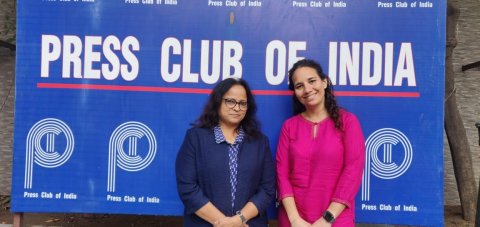Bringing researchers and journalists together: Our first workshop trial, in partnership with DNDi

A few weeks ago, I was lucky enough to help deliver a workshop in Delhi, in partnership with DNDi, between researchers and journalists. After years of wanting to do this, and of thwarted plans, we were finally able to deliver our first workshop of this kind. It was a great success and a big learning experience.
The idea of bringing these two important audiences together to strengthen links and explore ways of working together has been an ambition of ours since 2019. When we hosted the European Congress on Tropical Medicine and International Health (ECTMIH) 2019 in Liverpool, we heard about the importance of ensuring researchers had the skills and networks to talk about their work more publicly, and of sharing science with their communities and the wider world. We talked about the need for journalists to have accessible and evidence-based science from which to write their pieces. I can only imagine that COVID-19 made these needs even more urgent and important.
Our motivations were around countering fake news, providing communities with more knowledge of research and science, and improving the skills and networks of these two vital sets of stakeholders. In 2019 we started to talk to partners including DNDi, who have already delivered work in this area, to see if we could trial joint workshops around this concept, in India and Rwanda.
Unfortunately, COVID-19 lockdowns meant our plans were changed and so the workshop in Delhi was the first opportunity to trial our idea.
This short meeting was attended by a range of journalists, working in different areas of the media, with representation from researchers.
The discussion enabled us to understand the challenges of both groups – challenges that I am sure are known by many of us who have worked in either of these areas.
'Working towards the same outcomes’

It was clear early on in discussions that we are all working towards the same outcomes, to achieve an impact in health. Just establishing this shared goal was such a welcome and helpful reminder for our work, which is often bringing together different stakeholders and experts to try and achieve the big goals.
For researchers, this includes the importance of sharing important findings, which can have a positive impact on communities, on knowledge and on further research. As we well know they spend anything from weeks to years cultivating their work and projects which finally produce outcomes to be shared. We talked about the challenge of trusting someone else to write about this precious piece of work which took so much time and energy to create, and may seem so very complicated and important to get right.
Some of the challenges for researchers that we hear about includes not having a clear understanding of the differently types of media channel and approach which dictates such important things as the length, tone, style, deadline of writing, and which kind of media and journalist is best suited to the information you would like to share.
For journalists, the challenges are often the need to work to very tight deadlines, in areas where they may not be specialists. Knowing the best researchers to comment on an area of work, and having the ability to access them easily, are some of the other challenges journalists face. They talked about their skills in understanding and reframing health to be understood by the wider public and the need to have trust on both sides for that to work well.
Local experts
Having access to local specialists when talking about local impact on local communities is so important and yet sometimes it is easier to find access to someone from a different region of the world. This is one of things we really want to help with – improving these local networks.
We talked about some simple next steps which would be very valuable for both researchers and journalists, and may help to tackle some of the hurdles. Examples included a glossary of terms so we all understand each others work and terminology better. This may include explaining how clinical trials work, and their different forms. It could be explaining the many different disciplines in health, and those which can exist both between and within one disease area. It could be explaining the difference between a feature and news article, or what a wire service means.
We touched on ways in which we could start to bring these stakeholders together on a more regular basis, and also about some goals we could work on together. Having conferences where we could combine sharing knowledge, building networks and discussing shared projects is an idea that seems worth exploring.
In India, and perhaps in many other countries too, the hubs of contact details for journalists and writers on health are not so readily available and perhaps we could work with partners to develop that. We have networks of many thousands of researchers across the world, through our journals, our grants program and in our membership networks, so we see ourselves as having a role in bringing these together. During the discussion I heard about a fantastic project which brought together researchers, journalists and civil society to address some major health issues in the past and was inspired to continue to develop these workshops and other support we can bring through our networks.
Next steps
This was the first of these activities for RSTMH. We look forward to working with DNDi and other partners to develop this idea into a programme of activities in a number of regions in the coming months, as part of our new strategy.
